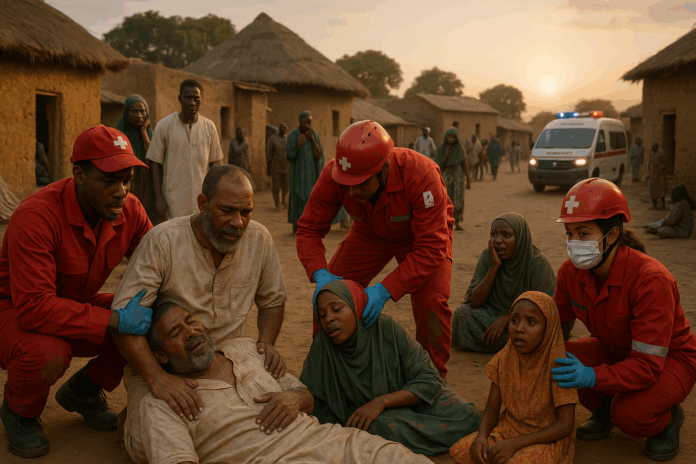On Sunday, June 8, 2025, during the Eid-el-Kabir celebrations, a devastating incident occurred in Gwabro village, located in the Tangaza Local Government Area (LGA) of Sokoto State, Nigeria. A locally made Improvised Explosive Device (IED) detonated, resulting in the tragic loss of six lives and critically injuring three others. The victims were reportedly traveling from Gwabro to the nearby Zurmuku community when they inadvertently triggered the explosive device. The explosion has been attributed to the Lakurawa terrorist group, a faction affiliated with the Islamic State Sahel Province, known for its violent operations across parts of Sokoto and Kebbi States.
Incident Details
Location and Timing
The explosion occurred in Gwabro village, situated in the Tangaza LGA of Sokoto State, during the afternoon of Sunday, June 8, 2025. Eid-el-Kabir, also known as the Festival of Sacrifice, is a significant religious observance for Muslims worldwide. During this period, it is customary for individuals to visit relatives and friends to celebrate the occasion. The victims were among those traveling from Gwabro to the nearby Zurmuku community when they unknowingly encountered the explosive device.
Circumstances Leading to the Explosion
The victims, primarily men, were journeying on foot from Gwabro to Zurmuku, a common practice during Eid celebrations. While traversing the area, they inadvertently triggered the IED, leading to the fatal explosion. Eyewitnesses reported that the device was likely activated accidentally, possibly due to contact with the victims as they passed by the location. The explosion resulted in immediate fatalities, with three women sustaining critical injuries.
Casualties
The explosion claimed the lives of six individuals, all male. Additionally, three women were critically injured and were promptly transported to Tangaza General Hospital for medical treatment. The Tangaza Local Government Council extended support to the survivors by providing medical assistance and facilitating the burial of the deceased in accordance with Islamic rites.
Suspected Perpetrators: Lakurawa Terrorist Group
Group Profile
The Lakurawa group is an armed faction affiliated with the Islamic State Sahel Province, operating in Mali, Niger, and Kebbi and Sokoto states of Nigeria. Their activities are concentrated in five LGAs of Sokoto state: Tangaza, Gudu, Illela, Binji, and Silame. Initially founded as a self-defense group to fight criminals in the Nigerian bandit conflict, the group eventually became increasingly radical, oppressive, and opposed to regular state agencies. Lakurawa and was described as a ‘terrorist’ group in 2024.
Previous Activities
In December 2024, a Nigerian military airstrike targeting Lakurawa militants inadvertently resulted in the deaths of 10 civilians due to secondary explosions. The group has been linked to various criminal activities, including banditry, cattle rustling, and kidnappings, contributing to the growing insecurity in the region. Reports indicate that Lakurawa has been active in imposing its ideology on local communities, leading to widespread fear and displacement.
Response from Authorities and Local Community
Government Actions
The Sokoto State Police Command confirmed the occurrence of the explosion and the resulting casualties. The Tangaza Local Government Council has been actively involved in supporting the victims’ families, providing medical assistance to the injured, and facilitating the burial of the deceased. Authorities are collaborating with security agencies to investigate the incident and prevent further attacks.
Community Reactions
The local community has expressed profound sorrow and concern over the incident. Residents are calling for enhanced security measures and increased vigilance to protect against future attacks. There is a collective plea for stronger collaboration between local communities and security agencies to address the growing threat posed by groups like Lakurawa.
Broader Implications and Ongoing Security Concerns
Impact on Local Communities
The attack has instilled fear and uncertainty among residents, disrupting the festive atmosphere of Eid-el-Kabir. Communities in the affected areas are grappling with the loss of lives and the physical and emotional trauma inflicted by the explosion. The incident underscores the vulnerability of rural communities to insurgent activities during periods of celebration.
Regional Security Challenges
The persistent threat of banditry and terrorism in Sokoto and neighboring states continues to undermine peace and development efforts. The emergence of groups like Lakurawa has complicated the security landscape, necessitating coordinated regional security strategies to combat these groups effectively. There is a pressing need for enhanced intelligence sharing, rapid response capabilities, and community engagement to address the multifaceted security challenges in the region.
The Sallah IED blast in Sokoto serves as a stark reminder of the ongoing security challenges in Nigeria’s northwest region. It highlights the vulnerability of rural communities to insurgent activities during periods of celebration. The attack has had a profound impact on the local community, leading to loss of life, injuries, and widespread fear.
Addressing the threat posed by groups like Lakurawa requires a multifaceted approach, including enhanced security measures, community engagement, and regional cooperation. Strengthening intelligence sharing and rapid response capabilities can help prevent future tragedies and restore a sense of safety and normalcy to affected communities.


